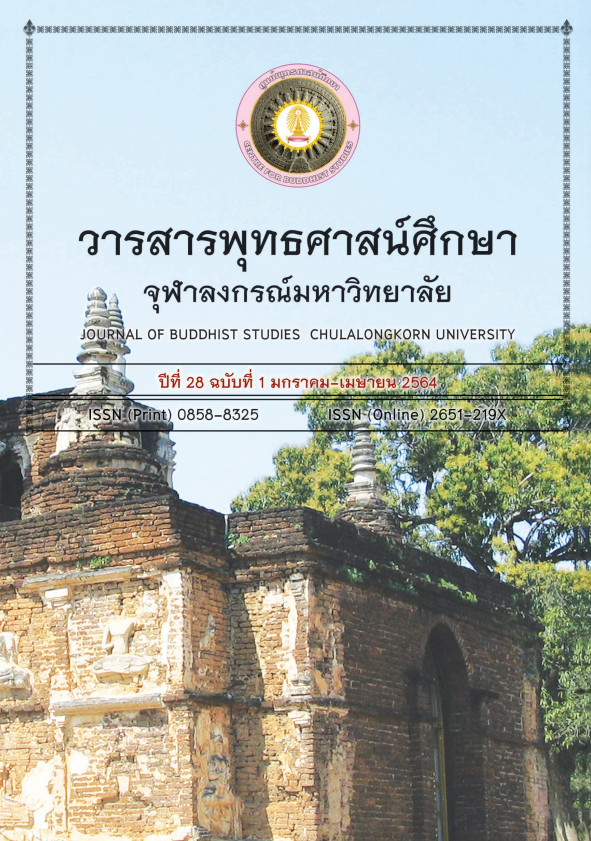Vessantara Jataka and Arguments on Human Trafficking
Keywords:
Vessantara Jataka, Vessantara Prince, Free Will, Human Trafficking, Human RightAbstract
This article aims to explore whether Prince Vessantara’s decision and action in donating his two children constitute human trafficking. The results derived from thorough textual analysis and interpretation of relevant Thai law show that that conclusion that Prince Vessantara’s intention and action are related to human trafficking may not be drawn. A further analysis of ancient Indian culture makes it possible that Prince Vessantara’s wife and son may have exercised their free will in their decision making no less than Prince Vessantara himself. Prince Vessantara did not make his decision more freely than the others. Rather, He made his decision within a set of cultural conditions different from another one which impacts his family.
Downloads
References
แบชัม, เอ. แอล. (2559). อินเดียมหัศจรรย์. กาญจนี ละอองศรี (บรรณาธิการแปล). กรุงเทพมหานคร: มูลนิธิโครงการตําราสังคมศาสตร์และมนุษยศาสตร์ ร่วมกับมูลนิธิโตโยต้าประเทศไทย.
ปรีชา ช้างขวัญยืน. (2541). พระปัญญาบารมีของพระเวสสันดร. วารสารอักษร ศาสตร์ จุฬาลงกรณ์มหาวิทยาลัย, 27(2), 11-21.
พุทธทาสภิกขุ. (2537). ภาษาคน ภาษาธรรม/ เรามา “กิน” เวลากันเถิด. กรุงเทพมหานคร: สุขภาพใจ.
มหาจุฬาลงกรณราชวิทยาลัย. (2539). พระไตรปิฎกภาษาไทย ฉบับมหาจุฬา ลงกรณราชวิทยาลัย เล่มที่ ๒๒, ๒๘. กรุงเทพมหานคร:
มหาจุฬาลงกรณ ราชวิทยาลัย.
ราชบัณฑิตยสถาน. (2540). พจนานุกรมศัพท์ปรัชญา อังกฤษ-ไทย ฉบับ ราชบัณฑิตยสถาน. กรุงเทพมหานคร: ราชบัณฑิตยสถาน.
วิสุทธ์ บุษยกุล. (2520). วิสุทธ์นิพนธ์. กรุงเทพมหานคร: โอเดียนสโตร์.
สมัคร บุราวาศ. (2516). ปรัชญาพราหมณ์ในสมัยพุทธกาล. กรุงเทพมหานคร: แพร่พิทยา.
สุมาลี มหณรงค์ชัย. (2559). พุทธยานกับความรัก. กรุงเทพมหานคร: ศยาม.
สุวรรณา สถาอานันท์. (2549). รายงานวิจัยฉบับสมบูรณ์โครงการเมตตาธรรม – ความเป็นธรรมในเวสสันดรชาดก. กรุงเทพมหานคร: สํานักงานกองทุน สนับสนุนการวิจัย.
Federman, Asaf. (2010). What Kind of Free Will Did the Buddha Teach? Philosophy East and West, 60(1), 1-19.
Olivelle, Patrick. (2009). The Law Code of Manu. Oxford: Oxford University Press.
Thapar, Romila. (2012). Reporting History: Early India. Social Scientist, 40(7/8), 31-42.
กระทรวงแรงงาน. (มปป.). ปัญหาการค้ามนุษย์. สืบค้นจาก https://www.mol.go.th/content/human_trafficking.
ประวิทย์ ร้อยแก้ว. (2560). พระราชบัญญัติป้องกันและปราบปรามการค้ามนุษย์ (ฉบับที่ ๓) พ.ศ. ๒๕๖๐. สืบค้นจาก http://tpso4.msociety.go.th/images/DatabaseTPSO4/Research/2560/Human_Trafficking/4.-Act-of-Trafficking.pdf.
มูลนิธิศุภนิมิตสากล. (2014). ชุดเรื่องเล่าจากผู้นําทาง: ปูทางสู่วิธีที่สร้างสรรค์ ในการจัดการกับการค้ามนุษย์และการอพยพที่ไม่ปลอดภัย. สืบค้นจาก https://www.wvi.org/sites/default/files/booklet%20Thai%20version%20rev.pdf.
สํานักงานคณะกรรมการกฤษฎีกา. (2551). พระราชบัญญัติป้องกันและปราบปราม การค้ามนุษย์ พ.ศ. ๒๕๕๑. สืบค้นจาก http://web.krisdika.go.th/data/law/law2/%BB47/%BB47-20-9999-update.pdf.
สํานักงานคดีค้ามนุษย์. สํานักงานอัยการสูงสุด. (มปป.). ประวัติความเป็นมาและนิยามของการค้ามนุษย์. สืบค้นจาก https://www.caht.ago.go.th/index.php/traffick-history.
สํานักงานว่าด้วยยาเสพติดและอาชญากรรมแห่งสหประชาชาติ. (2020). ปัญหาเกี่ยวกับพยานหลักฐานในคดีค้ามนุษย์. เอกสารสรุปประเด็นสําคัญของคดี. สืบค้นจาก https://www.unodc.org/documents/southeastasiaandpacific/Publications/2020/Case_Digest_Evidential_Issues_in_Trafficking_Thai.pdf.
Kosambi, D. D. (1964). The Culture and Civilisation of Ancient India in Historical Outline.
Mark, Joshua J. (2020). Indus Valley Civilization. Ancient History Encyclopedia. Retrieved from https://www.ancient.eu/Indus_Valley_Civilization/.
Swaminathan. (2014). Who is a Rishi? How many types of Rishis? Retrieved From https://tamilandvedas.com/tag/rsi/.
The Editors of Encyclopaedia Britannica. (1998). Manu-smriti. Retrieved from https://www.britannica.com/topic/Manu-smriti.
Wisdom Library. (2018). Rishi, aka: Ṛṣi, Rsi; 8 Definition(s). Retrieved from https://www.wisdomlib.org/definition/rishi.
Downloads
Published
How to Cite
Issue
Section
License
Copyright (c) 2021 Chulalongkorn University Centre for Buddhist Studies

This work is licensed under a Creative Commons Attribution-NonCommercial-NoDerivatives 4.0 International License.
บทความที่ได้รับการตีพิมพ์เป็นลิขสิทธิ์ของศูนย์พุทธศาสน์ จุฬาลงกรณ์มหาวิทยาลัย
ข้อความที่ปรากฏในบทความแต่ละเรื่องในวารสารวิชาการเล่มนี้เป็นความคิดเห็นส่วนตัวของผู้เขียนแต่ละท่านไม่เกี่ยวข้องกับศูนย์พุทธศาสน์ จุฬาลงกรณ์มหาวิทยาลัย และคณาจารย์ท่านอื่นๆในมหาวิทยาลัยฯ แต่อย่างใด ความรับผิดชอบองค์ประกอบทั้งหมดของบทความแต่ละเรื่องเป็นของผู้เขียนแต่ละท่าน หากมีความผิดพลาดใดๆ ผู้เขียนแต่ละท่านจะรับผิดชอบบทความของตนเองแต่ผู้เดียว






